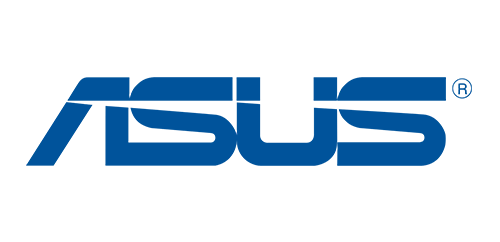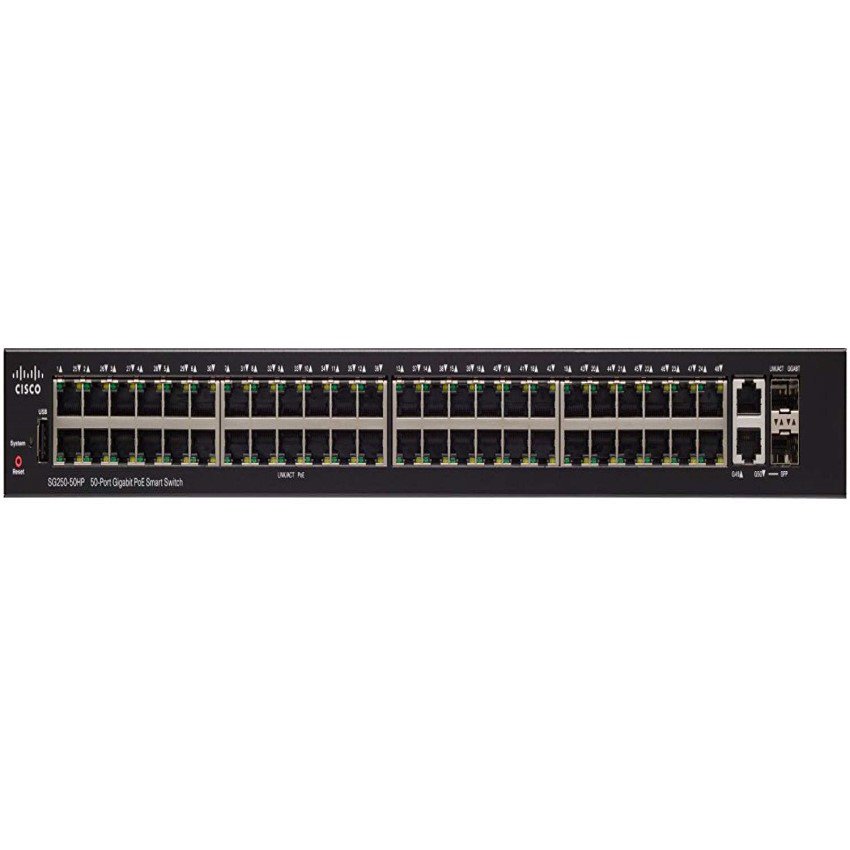| Model | SG220-50-K9-EU |
| Performance |
| Switching capacity and forwarding rate | Capacity in Millions of Packets per Second (mpps) (64-byte packets): 74.4
Switching Capacity in Gigabits per Second (Gbps): 100 |
| Jumbo frames | Frame sizes up to 9216 supported |
| MAC table | Up to 8192 MAC addresses |
| Total system ports | 50 Gigabit Ethernet |
| RJ-45 ports | 48 Gigabit Ethernet |
| Uplink ports | 2 Gigabit Ethernet combo |
| Layer 2 Switching |
| Spanning Tree Protocol (STP) | Standard 802.1d STP support
Fast convergence using 802.1w (Rapid Spanning Tree [RSTP]), enabled by default |
| Port grouping | Support for IEEE 802.3ad Link Aggregation Control Protocol (LACP): Up to 8 groups, Up to 8 ports per group with 16 candidate ports for each (dynamic) 802.3ad link aggregation |
| VLAN | Support for up to 256 VLANs simultaneously
Port-based and 802.1Q tag-based VLANs
Management VLAN
Guest VLAN |
| Auto voice VLAN | Voice traffic is automatically assigned to a voice-specific VLAN and treated with appropriate levels of QoS |
| QinQ VLAN | VLANs transparently cross a service provider network while isolating traffic among customers |
| Generic VLAN Registration Protocol (GVRP) and Generic Attribute Registration Protocol (GARP) | Protocols for automatically propagating and configuring VLANs in a bridged domain |
| Head-Of-Line (HOL) blocking | HOL blocking prevention |
| Loopback detection | Loopback detection provides protection against loops by transmitting loop protocol packets out of ports on which loop protection has been enabled. It operates independently of STP. |
| Automatic Media-Dependent Interface Crossover (MDIX) | Automatically adjusts transmit and receive pairs if an incorrect cable type (crossover or straight-through) is installed. |
| Security |
| ACLs | Drop or rate limit based on source and destination MAC, VLAN ID or IP address, protocol, port, Differentiated Services Code Point (DSCP)/IP precedence, TCP/UDP source and destination ports, 802.1p priority, Ethernet type, Internet Control Message Protocol (ICMP) packets, IGMP packets, TCP flag
Support up to 512 rules |
| Port security | Creates the ability to lock source MAC addresses to ports; limits the number of learned MAC addresses |
| IEEE 802.1X (authenticator role) | 802.1X: RADIUS authentication; guest VLAN; |
| RADIUS, TACACS+ | Supports RADIUS and TACACS authentication; switch functions as a client |
| MAC address filtering | Supported |
| Storm control | Broadcast, multicast, and unknown unicast |
| DoS protection | DOS attack prevention |
| STP Bridge Protocol Data Unit (BPDU) Guard | This security mechanism protects the network from invalid configurations. A port enabled for BPDU Guard is shut down if a BPDU message is received on that port |
| Spanning Tree Loop Guard | This feature provides additional protection against Layer 2 forwarding loops (STP loops). |
| Secure Shell (SSH) Protocol | SSH is a secure replacement for Telnet traffic. SCP also uses SSH. SSH v1 and v2 are supported |
| Secure Sockets Layer (SSL) | SSL support: Encrypts all HTTPS traffic, allowing highly secure access to the browser-based management GUI in the switch |
| Quality of Service |
| Priority levels | 8 hardware queues |
| Scheduling | Strict priority and weighted round-robin (WRR)
Queue assignment based on differentiated services code point (DSCP) and class of service (802.1p/CoS) |
| Class of service | Port based, 802.1p VLAN priority based, IPv4/v6 IP precedence/type of service (ToS)/DSCP based, Differentiated Services (DiffServ) |
| Rate limiting | Ingress policer, per VLAN and per port |
| Environmental |
| Dimensions (W x H x D) | 440 x 44 x 201 mm |
| Unit weight | 3.3 kg |
| Power | 100 to 240V 50 to 60 Hz, internal |








